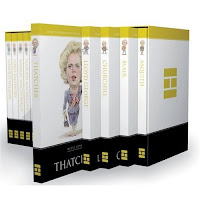 but BBC4 came up with a dream of a parlour game for political anoraks, the judging of the group of charlatans, power-seekers, visionaries, public servants and one or two straightforward weirdos who became British PM. Andrew Marr, a commentator who has lost a position and is still searching for a role, was chairing the debate with such usual suspects as Polly Toynbee, Andrew Roberts, Simon Jenkins, and that old political name dropper Anthony Howard. There were some interesting presentations.
but BBC4 came up with a dream of a parlour game for political anoraks, the judging of the group of charlatans, power-seekers, visionaries, public servants and one or two straightforward weirdos who became British PM. Andrew Marr, a commentator who has lost a position and is still searching for a role, was chairing the debate with such usual suspects as Polly Toynbee, Andrew Roberts, Simon Jenkins, and that old political name dropper Anthony Howard. There were some interesting presentations.I often don’t know what to make of Tony Benn. Utterly useless minister when given the chance to wield a bit of power; destroyed the Labour Party in the 80s; clearly mad; capable of utter incoherence when giving big political speeches; and yet actually he has passion, a sincere vision and a individual form of honesty. His take on Attlee was a relatively conventional one, but he was on the button when he pointed out that Attlee was not interested in his own image, but in how his policies could affect people, unlike his modern day successors.
When discussion came round to two arch-Tory pessimists, MacMillan and the Last
 Lord, Salisbury, there was a fascinating little interchange on Tory ideology. Andrew Roberts rightly observed that Toryism was about pessimism towards human nature, with a consequent political drive to contain humanity’s worst elements; Toynbee then piped up with some anti-conservative jibe to which the eloquent Simon Jenkins then responded of socialism, that you could say it saw humanity as evil and needing wholesale, state imposed change. Well, he was right about the practice, if not the ideology!
Lord, Salisbury, there was a fascinating little interchange on Tory ideology. Andrew Roberts rightly observed that Toryism was about pessimism towards human nature, with a consequent political drive to contain humanity’s worst elements; Toynbee then piped up with some anti-conservative jibe to which the eloquent Simon Jenkins then responded of socialism, that you could say it saw humanity as evil and needing wholesale, state imposed change. Well, he was right about the practice, if not the ideology!I knew the bit about Blair would annoy me, and Baroness Amos gave a ludicrously weak and laboured defence – typical of a New Labour groupie of no known distinction. Extraordinarily, she used his response to the July 2005 tube bombings as evidence of his greatness. Actually, his response, from an international gathering at Gleneagles, was of the same hammy level as all of his other hand of history speeches. What was missing, from Amos and Blair, was any recognition that the only reason the tube bombings occurred at all was the Iraq war that this PM so disastrously let us in for. Never has a leader so wilfully undermined the security of his own nation. Anyway, the discussion afterwards, however, was relatively favourable, even from Tory historian Roberts, who could usefully have been more scathing.
The final outcome of what was at times a genuinely interesting discussion, in the sort of civilised non-confrontational way that this type of programme has a habit of producing, was, inevitably, a reaffirmation of the history-making and history-writing Churchill as greatest PM of the 20th. Century. Thatcher had to make do with equality alongside Attlee and Lloyd George as the second-ranked PM. Not sure that was right though – I think she deserves to hold that position on her own.
 [Churchill, still Britain's greatest PM of the 20th. century, speaks in front of one of the US's greatest ever presidents, and no mean turner of a fine phrase himself - Lincoln]
[Churchill, still Britain's greatest PM of the 20th. century, speaks in front of one of the US's greatest ever presidents, and no mean turner of a fine phrase himself - Lincoln]


No comments:
Post a Comment